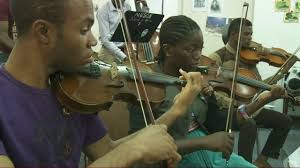![]()
If you’ve landed on this article page, you’re probably searching for a
good business idea—an idea that’s light on the pocket but heavy on
returns, promising both a fulfilling journey and potential profit.
|
How to start a Music School in Nigeria
Setting up a music school is a fulfilling and exciting venture
for anyone passionate about music education. Starting any new
business can be challenging, but with the right approach,
planning, and execution, it can be a rewarding experience. With
the wrong approach, it could be a costly mistake and drain your
love for teaching music, as well as your finances.
Research and Planning
The first step in setting up a music school is conducting
thorough research and planning. This step includes defining your
music school’s mission, vision, and values and conducting market
research to determine the demand for music education in your
area. You should also research your competition, understand what
they offer, and how you can differentiate your music school from
theirs.
Define Your Unique Selling Proposition (USP)
Successful businesses are skilled at identifying their USP or
unique selling proposition. Consider focusing on a niche that
the competition isn’t focusing on. You could also focus on
providing more value. For example, you could also provide
supplementary online course material in addition to in-person
lessons, which could help students get more out of their
lessons. By brainstorming ways to offer additional value to your
students, you can get more music students and keep them longer.
Consider the Overhead and Ongoing Expenses
Another critical aspect of planning is determining the financial
requirements to start and sustain your music school. You need to
create a budget that outlines all the costs associated with
setting up and running your music school, including rent,
equipment, staff, and marketing expenses. It’s crucial to factor
in a contingency fund in your budget to cater to unforeseen
expenses.
Create a (Lean) Business
Plan:
When creating a business plan for your music school, consider a
lean approach to business planning to minimize time and
resources. The lean approach is based on the book “The Lean
Startup” by Eric Ries. It introduces a methodology for
developing and managing startups, focusing on minimizing wasted
time, effort, and resources. Focus on the key elements, such as
your target audience, marketing strategies, revenue streams, and
financial projections. The Growthink website offers a helpful
guide on creating a lean business plan, which covers the
essential points concisely and efficiently. By following this
approach, you can create a solid business plan for your music
school without spending days researching and planning.
The marketing section of your lean business plan should
highlight how you intend to promote your music school, what your
brand identity will look like, and how you will advertise and
market your music school. Financial projections should be
realistic. You don’t want to be surprised by costs that are more
than you expected and revenue that is less than you planned for.
Use this information to project when your music school will
break even and start making profits.
Choosing the right location for your music school is important
to its success. You should look for a location that’s easily
accessible, preferably in a commercial or residential area. It
should be central to areas you want to target, such as between
two or three towns that are likely to have many potential music
students. Consider the competition when selecting a location;
you probably don’t want to start a brand new music school in
close proximity to an established one that is well respected in
the community. Ensure that the location has ample parking, is
secure, and has a pleasant ambiance that fosters a conducive
learning environment. The location should also be spacious
enough to accommodate your equipment, students, and staff.
Acquire Equipment and
Materials
When starting a music school, you should have the right
equipment and materials to provide high-quality music education
to your students. This may involve investing considerable money
in purchasing or leasing instruments, music books, sheet music,
and other supplies.
Determine what types of instruments you will need. This will
depend on the kind of music you intend to teach and the age
range of your students. Some common instruments used in music
schools include pianos, guitars, drums, violins, and saxophones.
Once you have a list of the instruments you need, you can
research the different brands and models available to find the
best options for your school. You can consider purchasing new or
used instruments depending on your budget and needs.
In addition to instruments, you’ll also need to purchase music
books and sheet music for your students. This will include
materials for different levels of expertise, from beginners to
advanced musicians. You can also consider creating your own
teaching materials or curricula if you have the necessary skills
and experience.
You’ll need to stock up on other supplies, such as music stands,
metronomes, and other teaching aids. These materials will help
your students learn and practice effectively.
Your music school’s success largely depends on your staff’s
expertise and dedication. This can be one of the most
challenging parts of running a music school. You must hire
qualified, experienced music teachers who share your school’s
mission and values and compensate them for their time. Ensure
your staff members are certified music educators knowledgeable
in various music genres and instruments. You can advertise
vacancies on online job boards, local music stores, or through
referrals from colleagues and friends. Additionally, you may
need administrative staff to help with scheduling, customer
service, and other administrative tasks.
Develop Your Curriculum
Your music school’s curriculum should be comprehensive and cater
to students of all ages and skill levels that you intend to
teach. You can develop a curriculum that focuses on a particular
genre or instrument or one that offers a broad range of music
classes. You should also consider incorporating music theory,
history, and appreciation classes into your music education
curriculum.
Ensuring that your music school’s curriculum aligns with state
and national music education standards is important. Consider
joining appropriate music teacher associations if you haven’t
already. It would help if you also encouraged your teachers to
incorporate innovative teaching techniques and technology into
their classes to make learning music fun and engaging for
students.
Marketing your music school is crucial to its success. You
should use various marketing strategies to promote your music
school, including online, social media, and traditional
advertising methods such as flyers, posters, and brochures. You
can also collaborate with local music stores, community centers,
and other organizations to promote your music school.
Additionally, you should adjust your music school’s strategies
and operations based on feedback and performance evaluations.
You may need to modify your curriculum or marketing strategies
or hire additional staff to meet demand. Regular evaluation and
adjustment can help you maintain a successful and thriving music
school.
Get our Practical Guide on How to start a Music School in
Nigeria. This Training will address the steps required to start
a music school successfully and illuminate some of the
challenges you should consider before you do.
|







